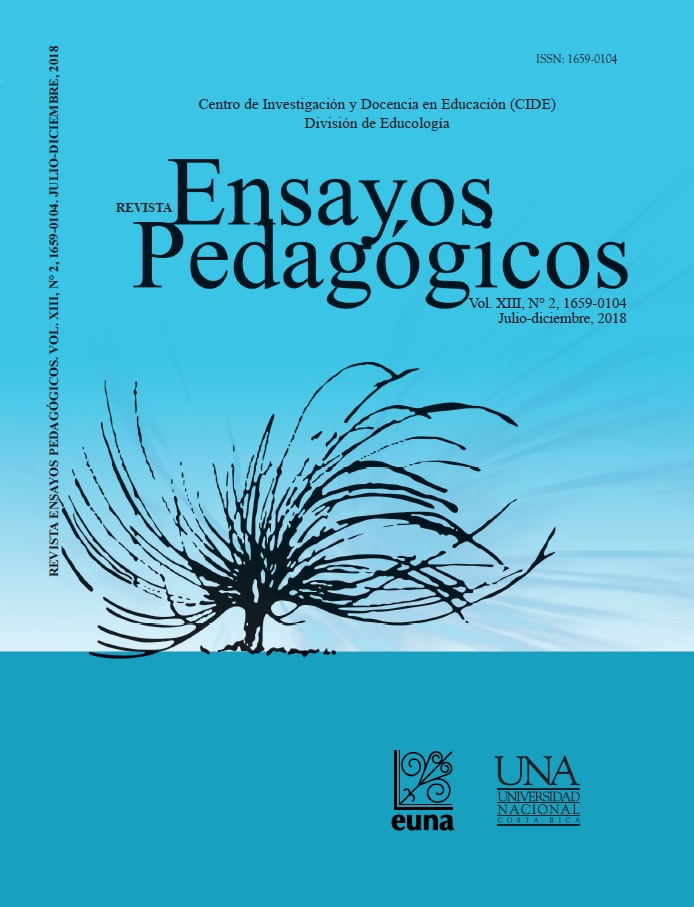Schools for Social Justice: Experiences of Leadership in Two Costa Rican Educational Institutions
DOI:
https://doi.org/10.15359/rep.13-2.8Keywords:
leadership, management, social justice and educationAbstract
Leadership for social justice is an issue that has gained relevance for professionals in education in many contexts around the world and Costa Rica is no exception. The objective of this study is the analysis around this theme, as well as the contribution of ideas both for practicing educators as well as those in training and for those who direct national educational policies. The interview protocol of the International Study of Leadership Development Network (ISLDN) and the Convention of the University Council for Educational Administration (UCEA) in the 2008 were used to interview two school administrators in a public preschool and a private multi-grade school. The results suggest a style of democratic and transformational leadership centered on aspects of social justice such as recognition and development of others’ capabilities. There were a number of similarities between the two cases related to four broad categories of social justice: economic, cultural, associative and developmental.
References
Barquero, M. A. y Montero, M. (julio-diciembre, 2013). Análisis comparativo de la gestión educativa como agente de cambio e innovación ante los complejos ambientes educativos, caso de las organizaciones: Colegio Nuevo Mundo y Colegio Técnico Profesional Piedades Sur, San Ramón. Revista Gestión de la Educación, 3(2), 43-67. Recuperado de http://revistas.ucr.ac.cr/index.php/gestedu/article/view/10648/10044
Bisquerra, R. (Coord.). (2014). Metodología de la investigación educativa. Madrid, España: Editorial La Muralla.
Bolívar, A. (2015). Justicia social y equidad escolar. Una revisión actual. Revista internacional de educación para la justicia social, 1(1). Recuperado de https://revistas.uam.es/riejs/article/view/308
Bourdieu, P., Passeron, J. C., Melendres, J. y Subirats, M. (1981). La reproducción: elementos para una teoría del sistema de enseñanza. Barcelona: Laia.
Contreras, F. y Barbosa, D. (2013). Del liderazgo transaccional al liderazgo transformacional: implicaciones para el cambio organizacional. Revista virtual universidad católica del norte, 2(39), 152-164. Recuperado de http://revistavirtual.ucn.edu.co/index.php/RevistaUCN/article/view/433
Cribb, A. y Gewirtz, S. (2003). Towards a sociology of just practices. En C. Vincent (ed.), Social justice, education and identity (pp. 15-30). New York: Routledge Falmer.
Fernández, J. M. y Hernández, A. (2013). Liderazgo directivo e inclusión educativa: Estudio de casos. Perfiles educativos, 35(142), 27-41. Recuperado de http://www.scielo.org.mx/scielo.php?script=sci_arttext&pid=S0185-26982013000400003
Freire, P. (2005). Pedagogía del oprimido. México: Editorial siglo XXI.
Garbanzo, G. y Orozco, V. H. (2007). Desafíos del sistema educativo costarricense: Un nuevo paradigma de la administración de la educación. Revista Educación, 31(2), 95-110. Recuperado de http://revistas.ucr.ac.cr/index.php/educacion/article/view/1246/1309
Hernández, R., Fernández, C. y Baptista, P. (2010). Metodología de la investigación. México D. F., México: Editorial Mc Graw Hill.
McKenzie, K. B., Christman, D. E., Hernández, F., Fierro, E., Capper, C. A., Dantley, M., ... y Scheurich, J. J. (2008). From the field: A proposal for educating leaders for social justice. Educational Administration Quarterly, 44(1), 111-138.
Molano, A. D. (2016). La gestión educativa: Hacia la optimización de la formación docente en la educación superior en Colombia. Sophia, 12(1), 55-70.
Montané, A. (2015). Justicia social y educación. RES. Revista de Educación Social, 20, 1-21. Recuperado de http://www.eduso.net/res/winarcdoc.php?id=542
Murillo, F. J., Krichesky, G., Castro, A., y Hernández-Castilla, R. (2010). Liderazgo para la inclusión escolar y la justicia social. Aportaciones de la investigación. Revista latinoamericana de educación inclusiva, 4(1), 169-186. Recuperado de http://ctescolaresmich.gob.mx/documentos/LIDERAZGO_PARA_LA_INCLUSION.pdf
Murillo, F. J. y Hernández, R. (2014). Liderando escuelas justas para la justicia social. Revista Internacional de Educación para la Justicia Social, 3(2). Recuperado de https://revistas.uam.es/riejs/article/view/337
Nussbaum, M. C. (2010). Sin fines de lucro. Por qué la democracia necesita de las humanidades. Madrid: Katz Editores.
Shields, C. M. (2004). Dialogic leadership for social justice: Overcoming pathologies of silence. Educational Administration Quarterly, 40(1), 109-132.
Silva, P., Slater, C. L., López Gorosave, G., Cerdas, V., Torres, N., Antunez, S. y Briceno, F. (2017). Educational leadership for social justice in Costa Rica, Mexico, and Spain. Journal of Educational Administration, 55(3), 316-333.
Woods, P. A. (2005). Democratic leadership in education. London: Sage.
Published
How to Cite
Issue
Section
License
Ensayos Pedagógicos is subscribed to the Attribution-NonCommertial-NoDerivatives 4.0 International Creative Commons Licence, which allows both authors and readers to freely download, store, copy, and distribute the final approved publisehd version of the manuscript (post-print) as long as this is done without commercial purposes, no derivative works are generated, and the source and author are mentioned. As well, Ensayos Pedagógicos declares that authors will remain the rightful owners of the copyrights of their work in perpetuity.







